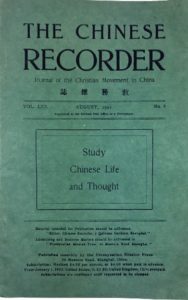The Humorous Harmonium, con’t.
23 March 2019Another amusing anecdote about the reed organ has come to the Project’s attention this past month, while we were (as usual) looking for something else. This is a letter to the editor, published in the venerable missionary journal, The Chinese Recorder, in the issue for September 1916 (p. 647). Written from Yungchow (Yongzhou) in southern Hunan province, it is yet another example of how the reed organ/harmonium played such large role in missionary life – especially in the introduction of Western music to Asia – and of the global reach of the growing U.S. music industry after the American Civil War.
The Project has not (yet) been able to identify the irritated Mr. Alfred W. Hill, but he does not seem to have been a missionary and was probably a businessman or other professional.
Estey reed organs were very popular, both in China and in ASPAC generally, at this date. From the 1880s Estey had even marketed a special ‘Acclimatized Organ’, which was supposed to stand up better to the local, humid climates.
To the Editor of “The Chinese Recorder.
Dear Sir: I wish to find a purchaser for an Estey Organ which has through an error come to be on my hands. The history of the error is this. Writing to a friend in Ireland for a friend in China for information re prices of organs, I was either so ambiguous or my friend in Ireland so stupid that he read my letter as a request to send out an organ. Almost the first thing I again heard about it was the organ’s arrival in China. An organ is about the one thing I don’t want, and I think if you publish this note in your correspondence columns, someone who may want an organ may be led to take the thing off my hands.
The organ in an Estey, Model BH, walnut, listed in England [at] £58. I am advised by my Irish friend, who made the mistake, to offer @ £30 price down.
With many thanks for space in your paper for my note.
Yours Sincerely,
Alfred W. Hill
Yungchow, Hunan
